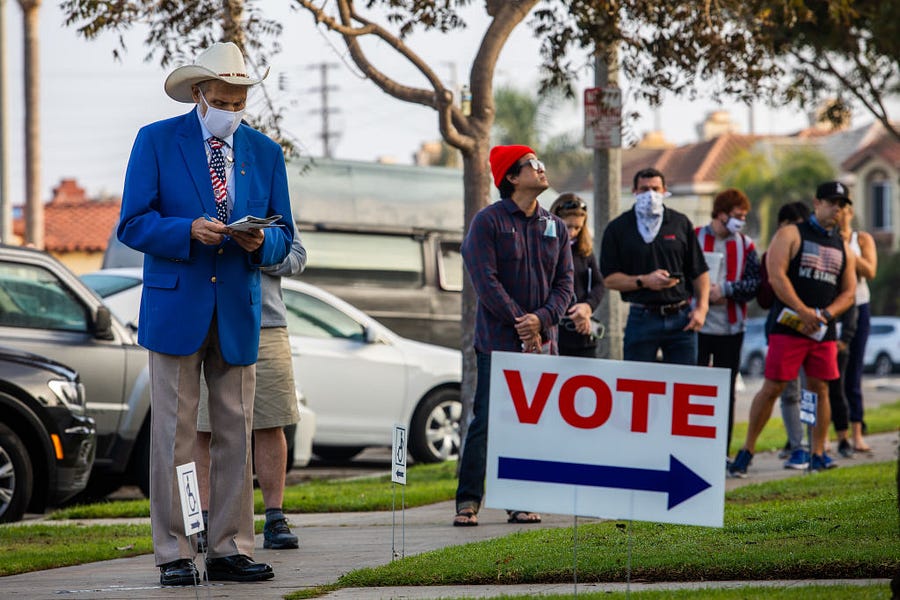You wouldn’t know it from how Republicans and Democrats are talking, but the 2020 election was actually a success.
During a pandemic, we had a national election with record-breaking turnout. The presidential candidate receiving the most votes in both the Electoral College and in the popular vote was rightly declared the winner and sworn in on schedule. There was no evidence of fraud that would have changed the results. The election was certified and tallied by Congress mostly on schedule.
Yes, that “mostly on schedule” elides the fact that Donald Trump spent months trying to steal an election he lost, culminating in a deadly insurrectionist mob swarming the Capitol.
But as terrible as that was, nearly everyone in a position of real responsibility and accountability, from former Vice President Mike Pence down to officials in Georgia, Arizona, Michigan, and Pennsylvania, did what the law and the Constitution required.
And yet, to listen to backers of the Democrats’ H.R. 1, the “For the People Act,” there’s no time to waste to save democracy or prevent a replay of January 6.
“The 2020 election has underscored the urgent need for transformational democracy reform,” Rep. Zoe Lofgren (D-Calif.) says. “Across the nation, Americans experienced unprecedented voter suppression.”
They did? It was the largest turnout in decades.
Indeed, voting was probably never easier than it was in 2020, and for good reason: There was a pandemic. This seems to have been lost on a lot of people. States changed their laws to make voting safer by making voting easier. We reduced long lines and got rid of crowded polling places in many places, not for the sake of convenience but for safety.
Republican complaints about these measures were almost entirely cynical and selective, aimed mostly at the states the Trump campaign thought it had the best chance of flipping to steal the election. Some criticisms had legal and constitutional merit. For instance, changes to election laws in some states were supposed to be authorized by state legislatures. But the time to challenge those changes—none of which amounted to fraud anyway—was before the election, not after getting results you didn’t like.
That didn’t stop the Republicans from trying to use the U.S. Supreme Court and then Congress itself on January 6 to nullify the rights of states to hold elections as they see fit. Democrats were rightly appalled by this attempted power grab.
Now, the positions are reversed. The “For the People Act” would in effect federalize elections. It would allow end-runs around state voter ID requirements; allow ballot harvesting (so long as the harvesters don’t get paid based on the number of ballots returned); require states to permit curbside voting, early voting, same-day registration, voting in the wrong precinct; and so on. It also heavily regulates political activity and speech to the point where even the ACLU has criticized it.
How any of this would have prevented Trump from trying to steal the election is a mystery. Indeed, the idea that this legislation is a response to the insurrection is hard to square with the fact that it was first introduced two years ago, after Democrats won the House in the 2018 midterms.
Republicans claim to be aghast at this assault on states’ rights—a position that would have a bit more credibility if many of them hadn’t just supported nullifying the votes of just enough states to hand the election to Trump.
It would also help their cause if Republicans in various state legislatures weren’t actively working to make it harder for Democrats—disproportionately black and Latino Democrats—to vote.
Both sides seem to be suffering from a kind of elite panic. Some Republicans have convinced themselves that they can’t win votes without severely restricting minority access to the ballot box, even though the GOP improved with minority voters in the last election. Republicans are even trying to restrict access in states they won rather handily.
Democrats not only look at record-breaking turnout in 2018 and 2020 and see evidence of voter suppression, they make it sound like any attempt to return to normal procedures after a pandemic is tantamount to the restoration of Jim Crow. Meanwhile, scholarly research suggests restrictions don’t help Republicans as much as some Republicans hope or as much as Democrats fear.
By all means, let’s have some reasonable reform efforts. But with Trump out of the White House and the pandemic almost over, there’s time to do it right.









Please note that we at The Dispatch hold ourselves, our work, and our commenters to a higher standard than other places on the internet. We welcome comments that foster genuine debate or discussion—including comments critical of us or our work—but responses that include ad hominem attacks on fellow Dispatch members or are intended to stoke fear and anger may be moderated.